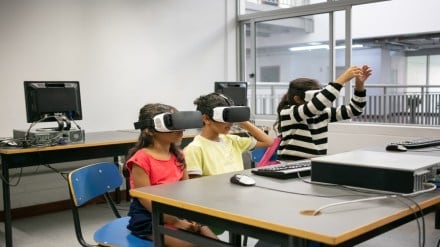By Preeti Bhandary
Learning begins for children from the moment they are in the womb. Within hours of being born, they can distinguish between sounds and voices. Experts believe children are like little sponges, absorbing information from their environment during this early stage. In the first few years of life, over 1 million neuron connections are formed in a child’s brain every second. This is a critical time to introduce them to early childhood learning, as it plays a fundamental role in their overall development.
ECE refers to the period from birth to the age of eight, which is critical for brain development. Children’s minds are extremely open to learning during this time, and the events they encounter determine their future academic and social successes. According to research, children who receive high-quality early childhood education perform better academically, have better social and emotional development, and have a higher probability of graduating from high school and pursuing higher education. Aside from academics, early childhood development has a significant impact on a child’s life in various ways.
What Makes a Quality Early Childhood Education Program?
Crafting an exceptional ECE programme for a child involves a dynamic, competitive, and well-thought-out approach. ECE educators weave a tapestry of engaging elements like songs, art, books, toys, games, and exploration tailored to captivate diverse age groups. A quality ECE program prioritises:
- Small Class Sizes: Encourages an intimate learning environment with low student-teacher ratios, promoting meaningful interaction.
- Expert Educators: Features qualified, experienced teachers who can actively involve students in the learning process
- Holistic Assessment: Addresses a child’s physical, socio-emotional, and academic well-being through comprehensive program assessments.
- Ongoing Support: Provides continuous coaching and mentoring for teachers, ensuring a supportive learning ecosystem.
Introducing children to education in their early years kindles a passion for learning, capitalising on their peak curiosity. ECE not only answers their questions but profoundly shapes their future, laying a robust foundation for lifelong learning.
Importance of High-Quality ECE
Early childhood education (ECE) provides significant advantages, but high-quality ECE programs offer even greater benefits. These programs feature adept educators, maintain low student-to-teacher ratios, and employ curricula aligned with cutting-edge child development research. Here are the key advantages of a high-quality ECE program:
Cognitive development:
Early childhood education programs are carefully crafted to support children’s cognitive development during the crucial early years. They introduce children to fundamental mathematical concepts, linguistic skills, and problem-solving abilities, igniting a lifelong passion for learning. This initial exposure provides essential knowledge and triggers a sense of curiosity and a sincere love for learning that will stay with them throughout their lives.
Social and emotional skills:
Beyond cognitive development, ECE plays a crucial role in supporting social and emotional intelligence. Within the organised setting of ECE programs, children build an ability to interact with their peers, cultivate empathy, and regulate their emotions. These skills are essential for establishing harmonious relationships, navigating the intricacies of human interactions, and effectively resolving conflicts throughout their lives.
Language and communication:
Early childhood education places a strong focus on language development. Children embark on their journey of acquiring linguistic skills right from birth, and ECE programs serve as accelerators, enhancing their vocabulary, refining their storytelling capabilities, and encouraging powerful communication. These proficiencies empower children to express themselves effectively in diverse situations.
Preparation for Formal education:
Early Childhood Education acts as a vital link between preschool and formal schooling, empowering children with the essential skills and knowledge to step into kindergarten and elementary school with confidence. Equipped with a solid foundation in literacy and numeracy, they are better prepared to thrive in structured academic settings.
Early identification of special needs:
ECE experts undergo training to detect indicators of developmental delays or learning disabilities, enabling timely intervention. This early assistance can significantly impact a child’s future achievements by addressing challenges before they escalate into formidable hurdles.
ECE Build Blocks for future success
ECE forms the bedrock for future success by equipping children with essential skills and knowledge crucial for academic achievement. Through interactions with peers, cooperative group activities, attentive listening, critical thinking, and problem-solving exercises, children develop foundational abilities. Moreover, effective ECE stimulates language and literacy skills, encompassing reading, writing, and basic math—building a robust educational groundwork for their future academic pursuits.
The Way Forward
Early Childhood Education doesn’t merely mark a starting point; it lays the bedrock for a child’s forthcoming triumphs. It nurtures social, cognitive, and emotional development, offering the skills needed for a prosperous academic journey and a gratifying life. Moreover, it is necessary to give paramount importance and resources to early childhood education, ensuring that each child embarks on a course toward accomplishment. In taking this step, the succeeding generation will flourish and make constructive contributions to society, thereby providing a more radiant future for everyone.
The author is the co-founder of Little Elly.
